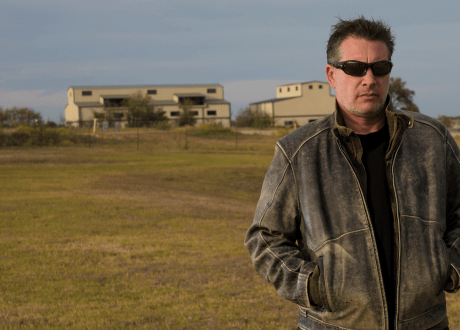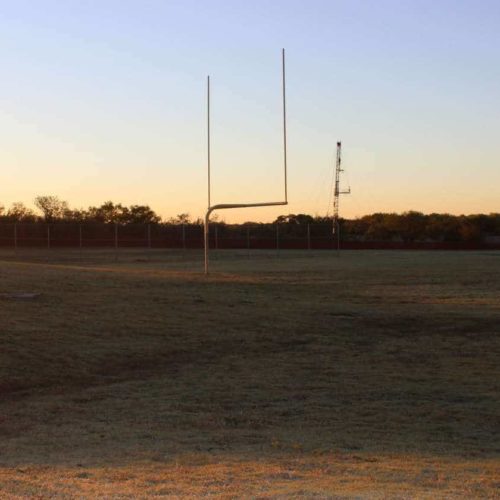Introduction
MANSFIELD, Texas—The 15 natural-gas wells near a high school, a daycare, a performing arts center and a neighborhood might be hard to see, but they’re difficult to ignore.
Smoke, foul odors and strange substances have come from them, according to residents’ complaints to regulators. Foam from one of the sites floated into the neighborhood a year ago, falling on trees and lawns. Another time, the well operator vented gases and chemicals directly into the air without attempting to contain them or burn them off, drawing a violation notice from the state. An accidental gas leak in September was fixed only after a neighbor heard the hissing sound as she stood at her back door.
It’s taken months for a handful of citizens in this suburb of Fort Worth to gather information about these events, cobbled together through open-records requests and persistent emailing. Each new piece of the puzzle makes them more upset.
Now they’re pressing for tougher local regulations, hoping their city of 61,000 will join the growing number of North Texas communities that have tightened their public-safety rules in this birthplace of modern hydraulic fracturing.
“They’re just going to have to be more protective of people,” said Tamera Bounds, a 33-year resident of Mansfield who’s active in the regulation push.
Her city sits atop the Barnett Shale, a gas-rich formation that stretches across populous areas, including Dallas and Fort Worth. Hydraulic fracturing — “fracking,” the process of shaking loose gas and oil with water, sand and chemicals — made it possible to tap what had previously been all but trapped.
Now the Barnett has more than 16,000 gas-producing wells and thousands of engines, tanks and other necessary infrastructure, all helping get fuel to consumers but also emitting air pollutants ranging from methane to the carcinogen benzene. Their proximity to people — and the mounting evidence that such proximity can carry health risks — has driven grassroots efforts in some communities to get more control over how or where the sites operate.
Residents typically focus on local rather than state rules. Texas is an enthusiastic supporter of oil and gas, reaping billions of dollars a year from taxes and royalties paid on that production.
When the Barnett city of Denton banned hydraulic fracturing last month, one of the lawsuits filed the next morning came from the state’s land commissioner.
The ban — approved 59 percent to 41 percent by voters — is the first in a Texas city. Other types of local rules are more common, such as buffers separating wells from homes and other buildings.
State environmental regulators require only a 50-foot cushion in the Barnett, leaving it up to towns and cities to decide if that’s sufficient.
Mansfield has a 600-foot buffer between well sites and residential property lines, though homeowners can agree to halve it. When homes are built after the wells, the minimum distance is 100 feet.
That’s similar to rules in the cities of Fort Worth and Arlington to the north. Bounds’ Mansfield Gas Well Awareness group wants to take a cue from two other Barnett communities — Dallas and the upscale town of Flower Mound, which both set 1,500-foot buffers.
The group also asked for mandatory emission controls on existing wells less than 1,500 feet from sites such as homes.
The Mansfield City Council held a work session last week to hear those residents’ concerns and get feedback from energy companies and state regulators. Mayor David Cook said city staff will look at other cities’ ordinances and present proposed revisions to the council.
Many Texas communities are having similar discussions, said Mansfield spokeswoman Belinda Willis.
“I think for a lot of cities, there was a learning curve with all of this activity,” Willis said.
Downwinders at Risk — a North Texas group that presses for cleaner air — sees Mansfield as a significant battleground in the war over oil and gas regulations.
Mansfield is “more blue collar, and more pro-industry than any other city that’s been challenged over their old drilling ordinance in the last several years,” Downwinders’ Jim Schermbeck said in a call-to-action blog post last week. One of the city’s councilmen, he pointed out in another post, heads government-relations efforts for a major Barnett gas-exploration firm.
Drilling in Mansfield began almost a decade ago as the Barnett boom intensified. Now there are 206 natural-gas wells here — an average of five per square mile — with 306 more approved. With them has come infrastructure such as the Mansfield Compressor Station, which keeps gas moving through the pipeline.
The pace of new well activity slowed in the last few years, as it has throughout the Barnett. Lower gas prices pushed energy firms to shale plays with more oil. But residents who want Mansfield to institute a 1,500-foot setback expect a fight.
Dallas passed its ordinance a year ago to sharp criticism from the industry, which said it amounted to a de facto ban.
Chris Faulkner, chief executive of Dallas-based Breitling Energy and an outspoken advocate of fracking, summed up his thoughts on what constitutes a reasonable buffer: “Between 600 and 1,200 feet — let’s just call it an average of 1,000 feet. I don’t think any of us would have a problem with that.”
Some residents think that’s plenty. In Texas communities that considered bigger setbacks, criticism came not only from operators but also from residents concerned about the potential effects on royalty checks. Some homeowners hold the mineral rights on their property; some don’t.
And the industry is such a part of everyday life in Texas that most residents who press for more gas-well regulation say they’ve been criticized by neighbors. What if new rules affect someone’s job? What if drawing attention to problems decreases property values?
“There’s a big division out here,” Bounds said of her neighborhood. “And I’m sure people have that in other neighborhoods.”

Digging for clues
When Lance Irwin moved to Mansfield 2 and a half years ago, he noticed the school and performing arts center south of his neighborhood of handsome brick houses and felt good about the location. He had no idea about the gas wells and infrastructure in between.
The Mansfield Compressor Station is the most visible of the sites, perched on a hill overlooking the two well pads, the school, the center and the neighborhood, but it’s no wonder he didn’t know what it was. The station looks like a couple of barns.
Then EagleRidge Energy drilled and fracked more wells on both pads last year, bringing the complex to the entire neighborhood’s attention.
The Texas Commission on Environmental Quality, known as the TCEQ, sent investigators several times in response to complaints about diesel odors and a white plume rising from the pad sites in October 2013. They didn’t find any violations, and the residents who’d complained were duly informed.
But a separate “reconnaissance investigation” on one of those well pads that same month did end with a violation notice.
Irwin, whose son was at the nearby day-care center the day the air-quality violation occurred, discovered it only after he filed open-records requests for all documents associated with the sites. He wasn’t happy that the TCEQ hadn’t said anything to residents.
An agency spokesman, Terry Clawson, said by email that residents are notified about investigations into their complaints, but the overlapping reconnaissance effort was not associated with the complaint investigations.
The investigator showed up while EagleRidge was conducting “flowback” operations on a well, when the pumped-in water and chemicals come back up along with volatile organic compounds from the formation. That’s a point at which air pollutants can spike if not handled carefully, and the investigator found EagleRidge didn’t follow rules intended to reduce those emissions.
The company could have captured the flowback, a process known as a “green completion” that will be required of gas-well fracking or refracking operations in the country starting Jan. 1, or could have burned the emissions to destroy most of the chemicals. Instead, EagleRidge handled flowback from several wells on site by venting the emissions directly into the air, the TCEQ investigation found.
EagleRidge, which did not return calls seeking comment, told the TCEQ that Mansfield did not allow flaring — a method of burning emissions. It wasn’t clear from the report why the company didn’t opt for another combustion method, which the investigator said is permitted in the city, or a green completion.
When EagleRidge brought in a combustion device to deal with future flowback operations, the TCEQ investigator considered the violation resolved.
Irwin went looking for help. Sharon Wilson, perhaps Texas’ best-known drilling-reform activist, blogged about what Irwin had found, commenting that “breaking the law in Texas is actually cheaper” than getting required equipment.
“That’s how we roll in Texas!” wrote Wilson, who joined environmental group Earthworks’ Oil and Gas Accountability Project after her own bad experience on the shale.
Irwin kept digging. He gathered information about potentially hazardous ingredients in the foaming agent EagleRidge used that landed in his neighborhood last year. About the gas leak Bounds discovered in September, five hours after it had started. About an oily substance neighbors found on their properties in May.
Some of his requests produced conflicting information. The material-safety data sheet provided to the TCEQ about the foam incident referred to one foaming agent, described as a skin and respiratory irritant in cases of a single overexposure. The sheet Irwin received from the local fire department referred to another product, that one “toxic to the reproductive system.”
Other efforts led to dead ends.
The TCEQ said the oily substance didn’t appear to come from an oil or gas facility, based on a microscope analysis that found plant and insect material in it. But the analysis also found a substantial amount of unidentified particles, and Irwin wondered if the compressor station could have been the source.
So he asked for documentation on whether the complex had a “blowdown” that day, a process by which gas and a mixture of compounds are vented. The TCEQ directed then-owner Texas Energy Midstream to produce the records operators are required to keep.
What Irwin got back was a blank spreadsheet.
“It very well could have been just some weird, anomalous thing that happened that has nothing to do with them,” Irwin said of the oily substance, “but the fact that they can’t produce a record … is ridiculous.”
Texas Energy Midstream, which sold the compressor station this fall, did not respond to requests for comment.
As he dug deeper, Irwin connected with other concerned residents, including Bounds. Mansfield Gas Well Awareness was born. The group’s year-long efforts to get more protections picked up steam in the last several weeks after Cook, the mayor, asked the council to hold the work session.
Cook said city staff will look at other communities’ rules and develop proposed changes to the ordinance that could be ready for the council to see in mid-January. He’s not sure what would be an appropriate setback, but he’s on board with the idea that emissions-control equipment can help.
“The technology is better and better every day, so we have to take advantage of the technology to protect our citizens, protect our property values, while at the same time respecting the rights that [mineral] owners have,” Cook said.
He expects Councilman Stephen Lindsey’s expertise will be helpful there, given his day job with oil and gas exploration firm Quicksilver Resources. Downwinders at Risk sees that as a conflict of interest, but Cook, noting that Quicksilver doesn’t drill in Mansfield, compared it to the way the council turns to him with some legal questions — he’s an attorney — and to an accountant on the panel when an issue is number-heavy.
Lindsey said he sits on the city council for the same reason he served in the Army after college and the State Department during the Iraq war: “I wanted to serve my country.” He said he testified before the state legislature last year to help stop a bill that would have taken away much of the local control cities have to regulate the industry.
“I do realize the confluence of growing activity among urban/suburban areas, that’s the friction point,” he said, speaking not as a Quicksilver employee but as a councilman. “My perspective is the industry could and should be doing a lot more things. … It is a highly regulated process with room for improvement.”
For Irwin, it’s hard not to be distrustful. Because new rules in one city can prompt action in others, he’s concerned that Lindsey — as senior director of governmental affairs for Quicksilver — has incentive to work against major change in Mansfield. Irwin figures that what he sees as safer standards to protect families, operators see as extra costs.
Lindsey said that if he ever thought he couldn’t “fairly provide perspective in my role as an elected official,” he’d recuse himself or resign.
On one major point Lindsey sees no potential push-pull between his two jobs. Because the state protects mineral rights, a drilling ban would be a nonstarter for a Texas city, he said. Both lawsuits targeting Denton’s fracking ban contend it’s unconstitutional because it would effectively stop drilling.
Bounds, a physical therapist assistant, said her allergies and asthma were worse during the period wells were drilled and fracked beside her neighborhood. It seems to her that companies think they have the constitutional right to pollute in the pursuit of minerals.
“I say, ‘No, you don’t,’” Bounds said.
Jim Morris of the Center for Public Integrity contributed to this article.
Read more in Environment
Environment
Chemical Safety Board cuts investigations amid alleged mismanagement
Allegations of severe mismanagement continue to haunt the Chemical Safety Board, tasked with investigating industrial chemical accidents
Environment
Environment stories you may have missed
The Center for Public Integrity’s best environment stories from 2014



Join the conversation
Show Comments